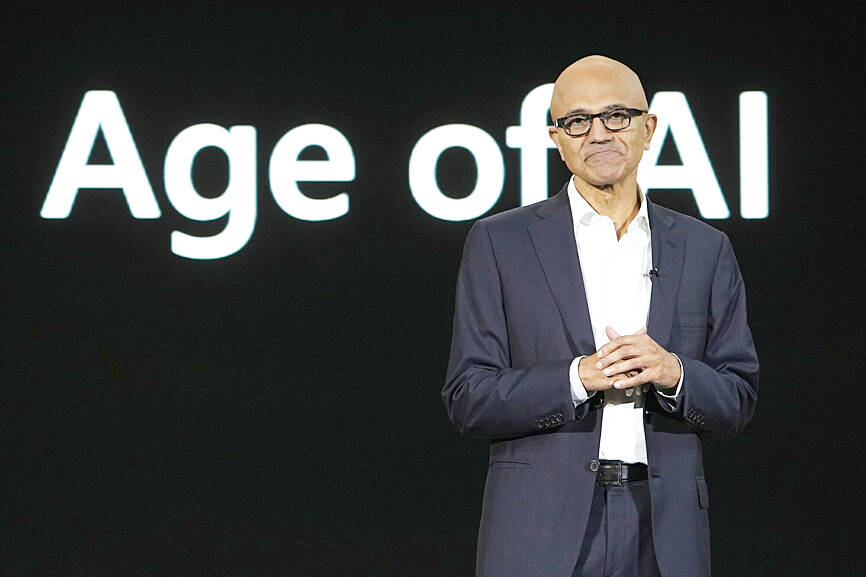Microsoft Corp CEO Satya Nadella pledged a US$1.7 billion investment in artificial intelligence (AI) and cloud computing to help develop Indonesia’s AI infrastructure after a meeting with the country’s president yesterday.
Indonesia is Southeast Asia’s biggest economy and has a population of about 280 million across its sprawling archipelago, with a growing demand for data centers and AI tech in the region.
Nadella held talks with Indonesian President Joko Widodo at Jakarta’s presidential palace before delivering a keynote speech about AI in the Indonesian capital.

Photo: Bloomberg
“The thing I am really excited to announce today is the expanded announcement of data center investment, so US$1.7 billion to bring the latest and greatest AI infrastructure to Indonesia,” Nadella told the crowd, adding that data centers would soon be built in Indonesia.
“We are going to lead this wave in terms of the next generation of AI infrastructure that’s needed,” he said. “Our mission ultimately is to empower every person and every organization in Indonesia to take advantage of this next big AI wave.”
The tech giant would provide AI training for hundreds of thousands of Indonesians, Nadella said.
“I’m very pleased to announce that we at Microsoft are going to train 2.5 million people by 2025 across the ASEAN region. In fact, 840,000 right here in Indonesia alone,” he said.
The investment would be over four years, Microsoft said in a statement.
Microsoft Indonesia president director Dharma Simorangkir said that the investment “sets a new milestone for Indonesia’s digital landscape.”
Nadella earlier told Widodo that the tech giant’s pledge was the “single biggest investment value” in the 29-year history of its business in Indonesia, Indonesian Minister of Communication and Informatics Budi Arie Setiadi said in a statement.
Research by global consulting firm A.T. Kearney showed that AI is poised to contribute US$1 trillion to Southeast Asia’s GDP by 2030, with Indonesia predicted to see more than one-third of that, the statement said.
Jakarta is lobbying Microsoft to open a research and development center in Indonesia, including in the planned new capital Nusantara that is due to open from August, Budi told reporters.
“We offered several places: Bali, IKN [Nusantara],” he said.
Nadella’s visit comes just weeks after Apple Inc CEO Tim Cook met Widodo and Indonesian president-elect Prabowo Subianto as the tech giant explores ways to diversify supply chains away from China.
Cook said that Apple is looking at potentially investing in manufacturing in Indonesia.
Nadella is traveling to Thailand and then Malaysia this week to promote Microsoft’s AI tech.

WEAKER ACTIVITY: The sharpest deterioration was seen in the electronics and optical components sector, with the production index falling 13.2 points to 44.5 Taiwan’s manufacturing sector last month contracted for a second consecutive month, with the purchasing managers’ index (PMI) slipping to 48, reflecting ongoing caution over trade uncertainties, the Chung-Hua Institution for Economic Research (CIER, 中華經濟研究院) said yesterday. The decline reflects growing caution among companies amid uncertainty surrounding US tariffs, semiconductor duties and automotive import levies, and it is also likely linked to fading front-loading activity, CIER president Lien Hsien-ming (連賢明) said. “Some clients have started shifting orders to Southeast Asian countries where tariff regimes are already clear,” Lien told a news conference. Firms across the supply chain are also lowering stock levels to mitigate

IN THE AIR: While most companies said they were committed to North American operations, some added that production and costs would depend on the outcome of a US trade probe Leading local contract electronics makers Wistron Corp (緯創), Quanta Computer Inc (廣達), Inventec Corp (英業達) and Compal Electronics Inc (仁寶) are to maintain their North American expansion plans, despite Washington’s 20 percent tariff on Taiwanese goods. Wistron said it has long maintained a presence in the US, while distributing production across Taiwan, North America, Southeast Asia and Europe. The company is in talks with customers to align capacity with their site preferences, a company official told the Taipei Times by telephone on Friday. The company is still in talks with clients over who would bear the tariff costs, with the outcome pending further

Six Taiwanese companies, including contract chipmaker Taiwan Semiconductor Manufacturing Co (TSMC, 台積電), made the 2025 Fortune Global 500 list of the world’s largest firms by revenue. In a report published by New York-based Fortune magazine on Tuesday, Hon Hai Precision Industry Co (鴻海精密), also known as Foxconn Technology Group (富士康科技集團), ranked highest among Taiwanese firms, placing 28th with revenue of US$213.69 billion. Up 60 spots from last year, TSMC rose to No. 126 with US$90.16 billion in revenue, followed by Quanta Computer Inc (廣達) at 348th, Pegatron Corp (和碩) at 461st, CPC Corp, Taiwan (台灣中油) at 494th and Wistron Corp (緯創) at

NEGOTIATIONS: Semiconductors play an outsized role in Taiwan’s industrial and economic development and are a major driver of the Taiwan-US trade imbalance With US President Donald Trump threatening to impose tariffs on semiconductors, Taiwan is expected to face a significant challenge, as information and communications technology (ICT) products account for more than 70 percent of its exports to the US, Chung-Hua Institution for Economic Research (CIER, 中華經濟研究院) president Lien Hsien-ming (連賢明) said on Friday. Compared with other countries, semiconductors play a disproportionately large role in Taiwan’s industrial and economic development, Lien said. As the sixth-largest contributor to the US trade deficit, Taiwan recorded a US$73.9 billion trade surplus with the US last year — up from US$47.8 billion in 2023 — driven by strong